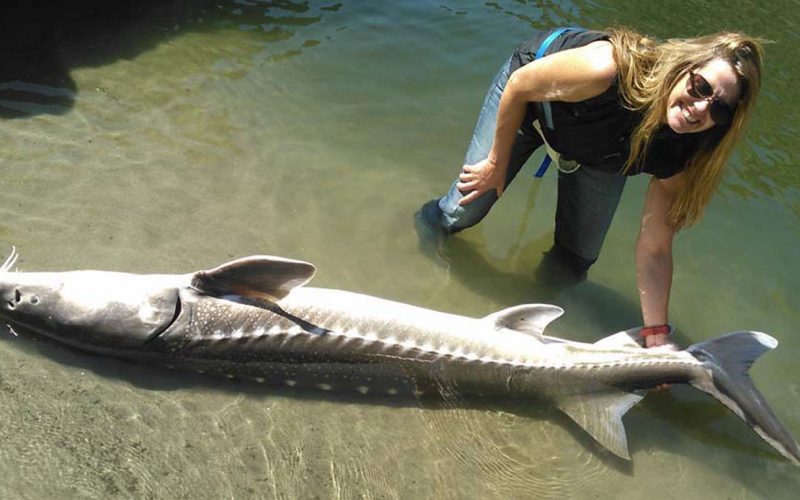
Courtesy Photo
Lea Graham, a widely published poet who has traveled the world from Fayetteville to Borneo to the Great Glen Way, will also read from her works Aug. 4 at Nightbird Books.
“I’d like to think that the Gar Gods ordained it,” Mark Spitzer says of his teaching job at the University of Central Arkansas, “but that’s not what happened. A creative writing professor job came up, and I applied and got it — and it’s a good thing, because I know I’m in the right place at the right time. I love to explore the always surprising geography in Arkansas, I can fish all year long, there’s a sophisticated, colorful, literary history here, and I know I’m privileged to be able to indulge my fascination with fish in this state and call it research. When you love your work, it isn’t work … it’s a bonus.”
Spitzer will read from his most recent book, “Beautifully Grotesque Fish of the American West,” published this year by University of Nebraska Press, at 7 p.m. Aug. 4 at Nightbird Books in Fayetteville.
“The most important part of this book is the conclusion,” he says, “where I actually offer some highly studied creative solutions to problems that range from local fishery management issues to the acceleration of global warming, which is taking its toll on our ice caps at the rate of 1 percent every year.”

Courtesy Photo
Teacher and author Mark Spitzer says he has “always been mesmerized by the ugliest, scariest, weirdest, most dismissed fish in our midst, because those are the ones we know least about.”
Here, Spitzer answers three questions for TFW:
Q. Where did your interest in the outdoors come from?
A. Growing up in Minnesota, my father always took me fishing. Our family of four would hike around in the woods and along the shore of rivers and lakes, and there was no shortage of canoeing and camping and mucking around in swamps. I was rewarded with fat frogs and mutant grasshoppers and crippled birds that I brought home. We had two 10-gallon aquariums that I filled with fish that I caught in the creek across the street. That sort of lifestyle was just way more interesting than sitting in front of the TV watching “Wide World of Sports” on Sunday afternoons, so I credit my parents for encouraging my fascination with the mysteries of the wild.
Q. What’s your first fishing memory?
A. It’s probably not my first fishing memory, but it’s one that makes all others before it moot and pretty much nonexistent because they can’t compete. I was 6 years old and fishing on a floating dock in Puget Sound back in the days when you could leave a kid unsupervised. My father and mother and sister were walking on the beach a quarter-mile away when I suddenly hooked something that felt like a manatee. I horsed it to the surface yelling “BIG FISH! BIG FISH!” all the while, and then I got a glimpse of it. It was a mongo-headed, bubble-eyed, toad-looking behemoth with gothically ornate fins busting up from the depths of hell! At least, that’s how I saw that cabezon, which was too big for me to land. My father came running, though, and he pulled it up on the dock where it spit out the sand dab I’d caught on a tube worm. That was my first monster fish, and now I’m an addict.
Q. How does one decide to write a book about homely fish?
A. I’ve just always been mesmerized by the ugliest, scariest, weirdest, most dismissed fish in our midst, because those are the ones we know least about. In a world where we’ve made a tradition of inventing monsters for millennia, we need look no further than the drainage ditch behind the fence or the dam at the local reservoir. They’re right there and they’re not made up, and ultimately, the problems fugly fish face in continuing to exist aren’t much different than ours. Keeping Biodiversity going strong in era of mass extinction is an urgent matter, especially when keystone predators are involved. This gives me a burning excuse to educate humans about our slimiest, creepiest, most neglected grotesques (which I like to think of as Jan Brady fish) that are just as vital to the food chain as all the beautiful trout and bass (aka, Marsha Brady fish) that we tend to focus on because they don’t threaten us. So basically, I’m taking the advice of Edmund to King Lear, and I’m sticking up for bastard-fish.
FAQ
Reading & Signing
With Mark Spitzer
WHEN — 7 p.m. Aug. 4
WHERE — Nightbird Books in Fayetteville
COST — Free; books will be available for purchase
INFO — 443-2080
FYI
Also at Nightbird
Lea Graham, a widely published poet who has traveled the world from Fayetteville to Borneo to the Great Glen Way, will also read from her works Aug. 4 at Nightbird Books.



